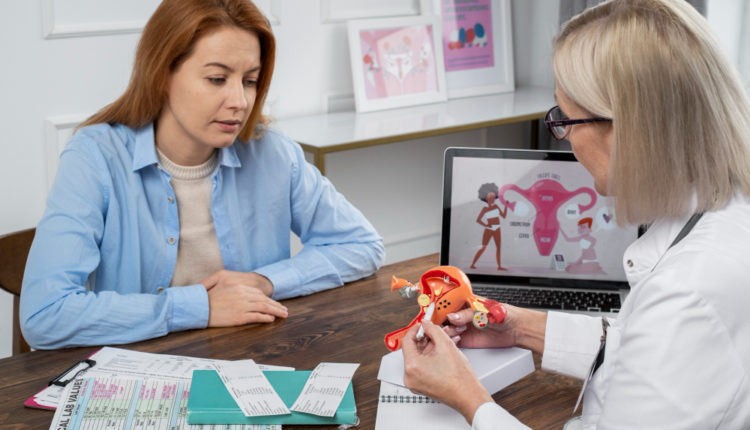Polycystic Ovarian Syndrome (PCOS) is a common hormonal disorder that affects many women worldwide. While PCOS is primarily known for its impact on the female reproductive system, it can lead to a myriad of complications affecting various aspects of a woman’s health. In this article, we’ll delve into the various complications associated with PCOS, shedding light on how this condition can have far-reaching effects beyond its initial diagnosis.
Understanding Polycystic Ovarian Syndrome (PCOS)
Before we explore the complications, let’s start with a brief overview of what PCOS is and its primary symptoms.
What is Complications of Polycystic Ovarian Syndrome?
PCOS is a hormonal disorder characterized by the presence of small, fluid-filled sacs (cysts) in the ovaries, along with imbalances in sex hormones like estrogen and progesterone.
Primary Symptoms of PCOS
- Irregular menstrual cycles
- Excessive hair growth (hirsutism)
- Acne and oily skin
- Weight gain and difficulty losing weight
- Insulin resistance
Now, let’s dive into the various complications that can arise due to PCOS.
Complications of Polycystic Ovarian Syndrome
1. Infertility
PCOS is a leading cause of female infertility. The hormonal imbalances and irregular ovulation associated with PCOS can make it difficult for women to conceive.
2. Metabolic Syndrome
Many women with PCOS develop metabolic syndrome, which includes high blood pressure, high cholesterol, and insulin resistance, increasing the risk of heart disease and type 2 diabetes.
3. Type 2 Diabetes
Insulin resistance often leads to type 2 diabetes in women with PCOS. Regular monitoring and management of blood sugar levels are crucial.
4. Sleep Apnea
PCOS is linked to sleep apnea, a condition where breathing repeatedly stops and starts during sleep, leading to poor sleep quality and daytime fatigue.
5. Endometrial Cancer
Irregular periods and prolonged exposure to high levels of estrogen increase the risk of endometrial (uterine) cancer in women with PCOS.
6. Depression and Anxiety
The hormonal fluctuations and emotional toll of living with PCOS can contribute to increased rates of depression and anxiety.
7. Obesity
Weight gain and difficulty in losing weight are common in women with PCOS, increasing the risk of obesity and its associated health problems.
8. Non-Alcoholic Fatty Liver Disease (NAFLD)
NAFLD is more prevalent in women with PCOS due to insulin resistance and metabolic issues, potentially leading to liver complications.
9. High Blood Pressure
Women with PCOS are at an increased risk of developing high blood pressure, which can lead to cardiovascular problems if left untreated.
10. Abnormal Uterine Bleeding
Irregular and heavy menstrual bleeding can cause anemia and negatively impact a woman’s quality of life.
11. Skin Issues
PCOS often leads to skin problems like acne, oily skin, and skin tags, affecting self-esteem and confidence.
12. Gestational Diabetes
Women with PCOS are at a higher risk of developing gestational diabetes during pregnancy, which requires careful monitoring and management.
13. Hormonal Imbalances
PCOS can cause hormonal imbalances beyond the reproductive system, affecting thyroid function and adrenal hormones.
14. Hair Loss
Thinning hair or male-pattern baldness can occur in women with PCOS due to excessive androgen levels.
15. Ovarian Cysts
While PCOS itself is characterized by ovarian cysts, sometimes these cysts can become large or painful, necessitating medical intervention.
Conclusion
Polycystic Ovarian Syndrome is a complex condition that can result in a wide range of complications affecting physical, emotional, and reproductive health. It’s crucial for individuals diagnosed with PCOS to work closely with healthcare professionals to manage and mitigate these potential issues. Early intervention and lifestyle modifications can play a significant role in improving the quality of life for those with PCOS.
Frequently Asked Questions (FAQs)
- Is PCOS curable? PCOS is not curable, but its symptoms and complications can be managed through lifestyle changes, medications, and therapies.
- Can PCOS lead to infertility in all women who have it? No, not all women with PCOS experience infertility. However, it does increase the risk, and many women with PCOS may require fertility treatments to conceive.
- How can I manage my weight with PCOS? Managing weight with PCOS involves a balanced diet, regular exercise, and sometimes medication to improve insulin sensitivity.
- Are there natural remedies for PCOS-related complications? While some natural remedies may help manage PCOS symptoms, it’s essential to consult with a healthcare provider for a personalized treatment plan.
- What’s the link between PCOS and mental health issues? Hormonal imbalances and the challenges of living with a chronic condition can contribute to depression and anxiety in women with PCOS.
In this article, we’ve explored the various complications associated with Polycystic Ovarian Syndrome. From infertility to metabolic issues and mental health concerns, PCOS can have a significant impact on a woman’s overall well-being. It’s essential for individuals with PCOS to be proactive in managing their health and seeking professional guidance when needed.
Now you have more information about complication of polycystic ovarian syndrome.

